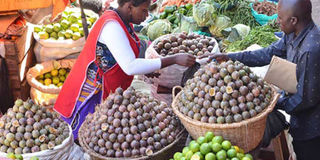Inflation to rise to 6 per cent, says Citi Bank

The price of food is expected to drive up inflation in the medium term. FILE PHOTO
Kampala- Citi Bank has projected that Uganda’s inflation will rise to 6 per cent by April 2019 because of increasing food prices and a pickup in aggregate demand by about 0.5 per cent.
In an interview in Kampala yesterday, Mr David Cowan, the Citi Africa chief economist, said economic outlook from global, regional to national level indicate there will be a rise in inflation amid moderate economic growth.
“Uganda’s inflation will be around 6 per cent. It will be caused by food crop prices (food crop inflation) and a pickup in growth output that will push up aggregate demand in the period,” he said.
Early next year, he said, inflation is likely to be in the range of between 4 and 5 per cent caused by both internal and international economic conditions.
As of end of June 2018, Uganda Bureau of Statistics said inflation had risen to 2.2 per cent up from 1.7 in the year ended May.
Core inflation declined to 0.9 per cent from 1.1 per cent over the same period.
In its June economic outlook, Bank of Uganda said inflation is expected to rise in the medium term.
The Central Bank projected inflation to have risen to 5 per cent by next year. Headline inflation is projected to rise to 4.4 per cent.
Mr Cowan also said the rate of currency depreciation in Africa will relax due to the likely weakening of the dollar. According to Mr Cowan, East African currencies had been consistently stable between 2016 and 2017 with the Kenyan shilling performing better.
Uganda and Tanzanian have been stable but have experienced pressure in the first half of 2018.
The Uganda shilling, he said, had by the close of June depreciated by 5.5 per cent. Bloomberg put the depreciation rate at 8 per cent.
“The Uganda shilling will deprecate against the dollar but we expect the [unit] to maintain the Shs3,800 rate up to the end of the year,” he said.
Stretching resources
Confidence: According to Mr Cowan, it is important that government builds policies that support economic confidence, especially in regard to currencies.
He also said government must be cautious in regard to capital spending to avoid stretching available resources.




